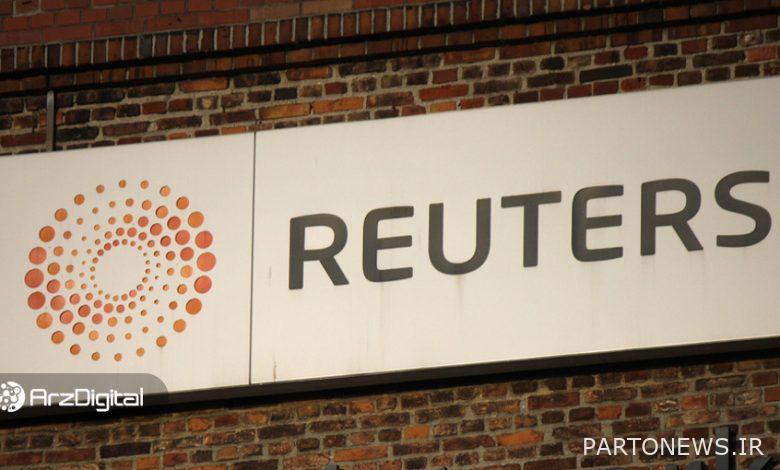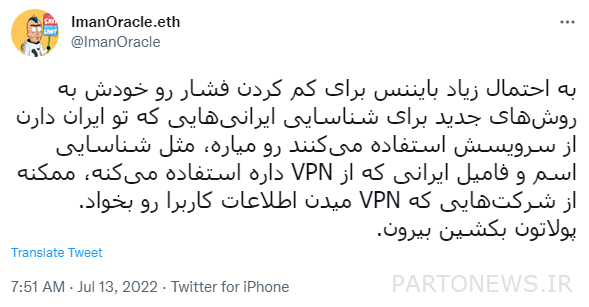Reviewing the controversial Reuters report; Should Iranian traders be worried about more strictness of foreign exchanges?

Reuters news agency Monday this week a report published in relation to Binance’s history in providing services to Iranian users after the resumption of part of the US sanctions between 2018 and 2021, in which quotes from a number of Iranian digital currency traders were also used. Now, Iranian users of foreign exchanges are worried that this report has attracted the attention of regulatory agencies and will encourage other international exchanges in which Iranians are now active to force authentication or tighten their regulatory regulations.
Exclusive to ErzDigital – Reuters news agency published a report this week regarding the activity history of Iranian traders in the Binance exchange. As it can be seen, the main purpose of this report was to examine the activity of Iranian traders in this exchange between 2018 and 2021; That is, the era at the beginning of which Binance had officially announced that it would no longer provide services to Iranian users due to sanctions, but due to the fact that authentication was not mandatory until around September 1400 (September 2021), Iranian users could only use an email address and a tool to change IP (like VPN), could operate in this exchange.
In order to present a documentary, Reuters interviewed seven Iranian traders in its report and concluded that between 2018 and 2021, a large number of Iranian users of Binance bypassed the restrictions of this exchange and traded on this platform.
Reuters in the past, obviously Reports has published against Binance, now claims that even though this exchange has made authentication mandatory for all its users since last year, and by doing so, it has somehow stopped the activity of Iranian traders, for providing services to Iranian users between 2018 By 2021, it may face follow-ups from American regulatory agencies. According to what Reuters wrote in its report, although Binance is not considered an American company, it may have violated secondary sanctions (sanction regulations that non-American companies are required to comply with) in providing services to Iranian users, and therefore The activity of this exchange in previous years should be examined.
Also read: The end of the work of Iranian traders in Binance; Where is the next destination?
This move by Reuters also resulted in the reaction of Chang Peng Zhao, the CEO of Binance Exchange, who pointed out the discrepancy between the title and the content of the Reuters report and wrote in a tweet:
News title: Binance has provided services to Iranian users despite sanctions in the past.
Content of the news: Binance blocked the access of Iranian users to its platform with the start of sanctions. In the meantime, seven people missed or found a way to face this restriction, and their access was blocked later.
Zhao continued this tweet in an advice to Reuters that they should not assume their media audience is stupid, because by doing so, they will lose them.
It is not clear whether Binance will continue to be in trouble due to its history of providing services to Iranian users, and it is only an idea put forward by Reuters reporters. What is more important than the conflict between Reuters and Binance in this case for Iranian traders of digital currencies is that it is possible that this report and its distribution in foreign media will make other exchanges that currently offer Iranian users without mandatory authentication provide services, scare them and force them to be stricter. For example, the KuCoin exchange, which has attracted many Iranian users after the mandatory authentication in Binance, decided to avoid the possible action of the American government by making authentication mandatory for all its users.
The next concern of Iranian traders is that Binance itself, under the influence of this trend or the pressure of regulatory bodies, will later pay more attention to checking user accounts and try to identify users from sanctioned countries such as Iran, who continue to use tricks such as using the identity of foreigners. or fake identities are authenticated and active in this exchange, identify and stop their activity. It should be mentioned that using the identity of other people or fake identities in Binance has already been a big risk and many Iranian traders prefer to operate in exchanges where authentication is not mandatory instead of accepting such a risk.

It is not clear to what extent this report will be considered or taken seriously by the international monitoring bodies, and for now we can only discuss its possibility; But in the worst situation that can be imagined, if the experience that Iranian traders had of being forced to authenticate in Binance is to be repeated in other exchanges such as Kocoin, the activity of Iranians in international platforms will be more difficult and limited than before. In such a situation, finding suitable options to replace centralized exchanges that have been used by Iranian users as an alternative to Binance for some time, will probably be more challenging than last time.

